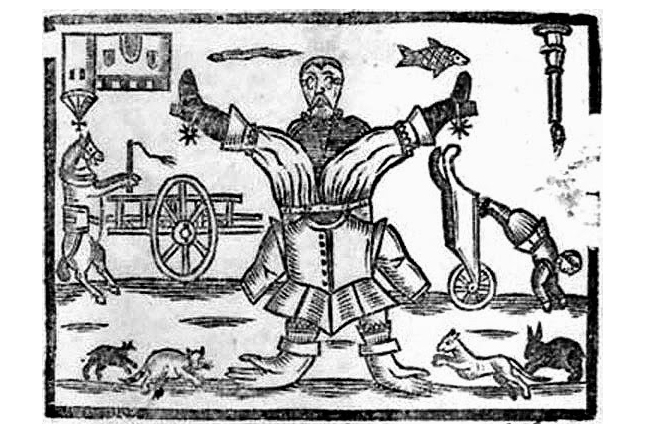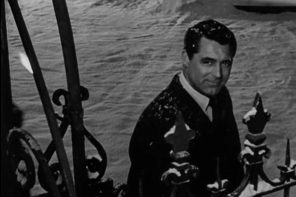In the 1640s, during the years of the English civil wars, a popular broadsheet with the title The World Turned Upside Down became the equivalent of a blockbuster.
In the chaos of the era print was cheap and plentiful, and the collapse of the licensing laws insured a degree of free speech hitherto unknown in the British Isles. The World Turned Upside Down would prove so enduring that it has been an English folk ballad for more than 350 years.
The song’s opening verse, “Holy-dayes are despis’d, new fashions are devis’d. /Old Christmas is kicked out of Town” remains pertinent. It seems that a supposed “War on Christmas,” whether real or imagined, has been going on for a very long time.
One of this season’s silliest skirmishes is certainly the Starbucks Christmas Cup ‘Controversy’—as per The Atlantic.
Whereas in previous years the coffee behemoth had offered up small, grande, and venti cups with (obviously secular) images of snowflakes and reindeer, 2015’s version has replaced this festive decoration with a minimalist, crimson blood-red design.
Supposedly this has enraged a portion of the Christian right, who view this decision as a rejection of Christian values. This portion of conservative Christians – exactly how many remains vague in media coverage – apparently views the crimson cups as evidence of secular humanistic creep, and the replacement of Christianity with a pluralistic perspective that these individuals view as an affront to their religious liberties.
Joshua Feuerstein, the activist (and known oddball) whose Facebook post attacking the chain over the issue is what initially went viral, claims that the company “wanted to take Christ and Christmas off of their brand new cups. That’s why they’re just plain red.” Feuerstein has encouraged customers to pretend that their names are “Merry Christmas” to seemingly force anti-Christian baristas to haplessly write a godly message on the apostate drink-ware. (This rather than a boycott, apparently.)
The so-called “War on Christmas” has been a staple of right-wing culture warriors for generations now, seemingly so incensed over people saying “Happy Holidays” that they can’t help but resort to hyperbole so bizarre that you can’t tell if it’s parody or not.
It’s this perennially aggrieved attitude that allows a writer at Breitbart.com to claim that the decision of a massive privately-held corporation (normally the heroes in conservative morality-plays) indicates that “Starbucks Red Cups Are Emblematic Of The Christian Culture Cleansing Of The West.”
That at this very moment ISIS is trying to actually ethnically cleanse entire regions of Christians makes the faux-outrage over a cup that happens to not have Rudolph the Red-Nosed Reindeer on it all the more obscene. That Mr. Feurstein and his supporters didn’t go a step further and claim that the Starbucks mermaid logo is actually the ancient Philistine deity Dagon is presumably a failure of creativity on their part. The irony over the kabuki-play that is our annual ceremonial anger over perceived attacks on Christianity is that the only actual sustained “War on Christmas” in the West was promulgated by religious Christians.
The irony over the kabuki-play that is our annual ceremonial anger over perceived attacks on Christianity is that the only actual sustained “War on Christmas” in the West was promulgated by religious Christians.
The World Turned Upside Down was written in angry response to an actual attempt at banning (or at least heavily regulating) Christmas festivities under Oliver Cromwell’s Puritan government in Britain, and concurrently in the charter-colonies of New England. The Puritans saw Christmas as tainted by “popery,” (after all, the word ends with “Mass,” which had also been abolished) and identified its extra-biblical elements as dangerously pagan.
In England there was fierce resistance to this attempt to regulate Christmas, where, as scholars like Eamon Duffy have demonstrated, the Reformation was hardly as seamless or as popular as triumphalist Protestant historiography has often portrayed it.
During the thirteen years that Christmas was replaced with a day of fasting by Parliamentary order there was fierce resistance among the populace. Celebrations were restored in 1660 with the Stuart Restoration, but the animus towards the holiday remained in America, where New England Puritans disparaged the holiday (as Bruce Forbes describes here) as both a Catholic and pagan innovation—one which encouraged drunkenness and slothfulness.
In 1712 Cotton Mather railed against “the feast of Christ’s nativity… spent in reveling, dicing, carding, masking, and in all licentious liberty…by mad mirth, by long eating, by hard drinking, by lewd gaming, by rude reveling!” In 1659 – a year before Christmas would return to Britain with Charles II – countrymen across the Atlantic in Massachusetts and Connecticut made the celebration of Christmas punishable by a five shilling fine.
The contemporary Christian Right often claims that the New England Puritans are their intellectual ancestors, but this is willfully misreading the historical record as surely as creationists misread biological evidence. Contemporary American fundamentalism, from its pre-millennial dispensationalist eschatology to its free-market economic ideology is at odds with the actual ideology of American Puritanism. The reductionist ‘culture wars’ obscure the nuances of history and culture, while failing to recognize the full complexity of both secularism and religion.
This year’s tempest in a coffee cup has provided us all with an unintended lesson in semiotics.
That someone might see Christianity in reindeer and snow-flakes (neither of which are mentioned in scripture) but not in the color red (which could certainly be anything from Christ’s blood to Eucharistic wine) – speaks to the arbitrary nature of symbols. They can only be understood within cultural context, and culture warriors would do well to remember that no secular order in American history has ever successfully waged a “War on Christmas,”—but that a Christian theocracy once did.





